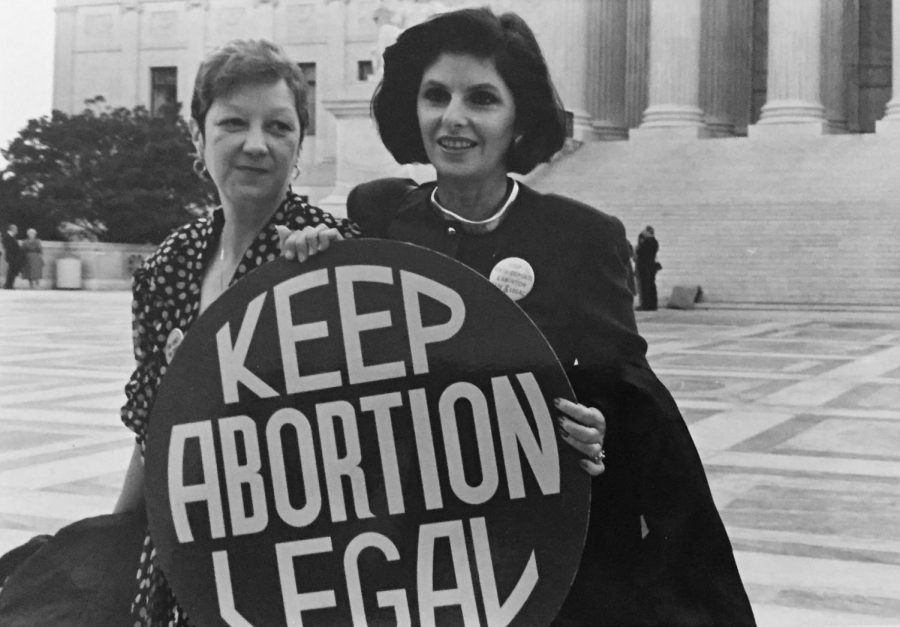A Decision of Epic Proportions
The modern-day impacts of one of America’s most influential court cases: Roe v. Wade.
Standing outside the Supreme Court was Norma McCorvery, also known as Jane Roe, in 1989 as she fought in the influential court case: Roe v Wade, and effectively triggering an endless debate in America.
March 12, 2019
Regardless of your political ideology, there is no doubting the impact that Roe v. Wade had on America’s political landscape. It is one of the few cases that politicians campaign on tirelessly. It makes enemies of friends and inspires non-stop, heated debate. And it’s all centered around a woman lost in history.
Her name? Norma McCorvey.
You may know her better as Jane Roe, who, with the help of attorneys Linda Coffee and Sarah Weddington, triggered an endless debate surrounding what is arguably one of the most polarizing topics in America. Like gun control, gay marriage, and separation of church and state, there’s almost no gray area, and even the moderates are usually left- or right-leaning.
She was a tired young woman of 21 when she made her impact on the United States, sparking a fire that would burn for decades, even after she passed away. In 1969, she found herself pregnant with a baby she couldn’t support sufficiently. In her mind, she determined the only solution to her dilemma was to get an abortion, an action that was forbidden by Texas law.
From a legal standpoint, Roe v. Wade is a Supreme Court case that caused more Americans to pick sides than ever before. Even though it happened 45 years ago, it continues to be a political tug-of-war, with neither side giving an inch.
The liberal side of the argument – called Pro-Choice – supports abortion and believes in the “freedom of choice,” meaning that they believe women have the right to choose what they want to do with their bodies, and the government shouldn’t be allowed to intervene in women’s rights. The conservative side – called Pro-Life – believes in the unborn child’s right to life, and thus, believes abortion is tantamount to murder. Roe v. Wade was the win that helped to support the argument for Pro-Choice.
A 7-2 decision for Jane Roe, with dissent by Justices Rehnquist and White, identified and protected the right to privacy that Pro-Choicers had been fighting for. (In case you didn’t know, the right to privacy was defined in another case called Griswold v. Connecticut; it is inferred from language in the 1st, 3rd, 4th, 5th, and 14th Amendments.) The case’s majority opinion established that a woman’s right to privacy had to be respected by all states because of the 14th Amendment’s Due Process Clause.
Since Roe, there have been nine important Supreme Court cases dealing with abortion that have been decided: Hodgson v. Minnesota, Gonzales v. Carhart, and Planned Parenthood v. Casey, to name a few. The most recent was Whole Woman’s Health v. Hellerstedt, decided in 2016. Although the last of these important cases was decided only three years ago, there’s a more recent one you might not have heard about: June Medical Services v. Gee.
The people that make up June Medical Services – the plaintiffs – are Bossier Medical Suite, Causeway Clinic, Hope Medical Group for Women, and two unidentified abortion doctors (John Doe 1 and John Doe 2). They are suing Doctor Rebekah Gee, the Secretary of the Louisiana Department of Health and Hospitals (LDHH), in order to get the Unsafe Abortion Protection Act (Act 620) struck down.
Act 620, translating from legal jargon, gives physicians who perform abortions four requirements: 1) that they have admitting privileges to a local hospital within 30 miles, 2) that they must notify the LDHH if a patient who has been administered any drug meant to induce an abortion has a bad reaction to the one administered, 3) that they must obtain the voluntary consent of the patient to administer them any drug to induce an abortion, and 4) if they perform more than five abortions per year, they must keep up the proper licensing to be allowed to continue performing abortions. Any violation of these requirements means a fine of $4,000 – for each one. June Medical Services is suing because they believe the requirements that Act 620 presents are an “undue burden” on women attempting to get an abortion.
If that sounds familiar, it’s because the “undue burden” standard originated from the Supreme Court case Planned Parenthood v. Casey, decided in 1992. It says that the state cannot enact a law that makes it significantly more difficult than it should be for a woman to get an abortion. The key here is “significantly more difficult” – what does this mean? What, exactly, is “significantly more difficult?”
An important note about this new case is that it begins to bring up a long ignored issue. Several states, even though many of their laws were made unconstitutional by Roe, haven’t taken them out, or have simply attempted to exploit loopholes in the ruling. By ignoring or avoiding the decision, these states have been allowed to keep their unconstitutional legislation, something that has irked many Pro-Choicers living in those states.
While the Court answers the question of the “undue burden,” we are left with yet another case that furthers the seemingly endless debate surrounding Roe v. Wade. We are stuck in an infinite loop, attempting to answer a question of, “Where do we go from here?” Unfortunately, given the deep divide, it appears that the people will not have an answer adequate for both sides any time soon.




